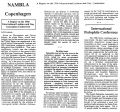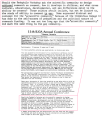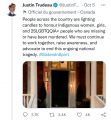One of our staff members is contributing considerably to a News Archiving service at Mu. Any well educated (Masters, PhD or above) users who wish to make comments on news sites, please contact Jim Burton directly rather than using this list, and we can work on maximising view count.
Historical examples of LGBT-MAP unity: Difference between revisions
The Admins (talk | contribs) No edit summary |
The Admins (talk | contribs) |
||
| Line 228: | Line 228: | ||
==Prominent gay people who speak from experience== | ==Prominent gay people who speak from experience== | ||
Gay celebrities such as '''Stephen Fry'''<ref>[https://www.greek-love.com/modern-europe/great-britain/boys-20th-century-boarding-school-experiences/stephen-fry-boyhood-pederasty Greek-love.com - Stephen Fry collection of testimony]</ref> and '''Elton John'''<ref>[http://web.archive.org/web/20080511143520/http://www.chrislowe.co.uk/interviews_neil_elton.html Neil Tennant <> Elton John discussion, Chrislowe.co.uk]</ref> recall stories of early encounters or yearning in their youths. Fry clearly shows a depth of knowledge on the subject, and Elton wishes he had been "molested" just for the experience. [[Testimony: Adult Male with Minor Male|Scotty Bowers]] - Bisexual, and fixer of Hollywood film Actors' sexual trysts, was unequivocal about his positive experiences from a very early age. Many similar examples exist, and they are not hard to find: | Gay celebrities such as '''Stephen Fry'''<ref>[https://www.greek-love.com/modern-europe/great-britain/boys-20th-century-boarding-school-experiences/stephen-fry-boyhood-pederasty Greek-love.com - Stephen Fry collection of testimony]</ref> and '''Elton John'''<ref>[http://web.archive.org/web/20080511143520/http://www.chrislowe.co.uk/interviews_neil_elton.html Neil Tennant <> Elton John discussion, Chrislowe.co.uk]</ref> recall stories of early encounters or yearning in their youths. Fry clearly shows a depth of knowledge on the subject, and Elton wishes he had been "molested" just for the experience. [[Testimony: Adult Male with Minor Male|Scotty Bowers]] - Bisexual, and fixer of Hollywood film Actors' sexual trysts, was unequivocal about his positive experiences with men from a very early age, and these included sex work. Many similar examples exist, and they are not hard to find: | ||
<div style="column-count:2;-moz-column-count:2;-webkit-column-count:2"> | <div style="column-count:2;-moz-column-count:2;-webkit-column-count:2"> | ||
Revision as of 17:58, 31 December 2024
 | ||||||
| NewgonWiki's series on MAP culture war and war of adjacency | ||||||
|---|---|---|---|---|---|---|
|
| ||||||
| "Normalization" | "Groomer" | Trans Kids Validity Policing | Lolicon Debate MAP & LGBT Alliances | Proship Pedophobia | Vigilantism | Moral panic Masculism | Feminism | Queer Ageism | Censorship | Hoax pedophilia Anti | Pro-recovery | Alternative Initialism Transage | Kinky Kids | Assimilationism Right-wing politics | Communism Activist model |
||||||
|
| ||||||
| Template: Adj - This template |
- Formerly allied LGBT (at the time Gay) and MAP (at the time Man/Boy Love and Pedophile) groups are referred to by their present names in the title of this article.
The modern LGBT (2SLGBTQQIA+ among other variations [1]) lobby is famously insistent and defensive[2] in its distancing attempts towards MAPs. Young LGBT people are routinely lied to by older community leaders about the history of their movement in embracing pederasts/pedophiles, providing shelter to "loved boys" and agitating for the removal of Age of Consent laws[3] - for example, at the 1985 ILGA conference detailed below. They are also taught to ignore the pederastic roots of their movement, the importance of numerous subversive pederasts, and presence of teenage hookers at Stonewall to name but a few inconvenient truths.
To MAPs, and others using MAP awareness to their advantage in a debate:
When LGBT people deny these facts, they may be corrected using the sources here. While LGBT Validity Policing frequently takes place on social media (and at the same time, many of us do not presently wish to associate with the LGBT Movement), it is still important to point out uncomfortable, widely-acknowledged historical facts.[4] There are also arguments in favor of identifying MAPs as "queer", or at least building alliances with others who feel marginalized by or disappointed with the corporate nature of the modern mainstream LGBT community and identity. Allyn Walker studied 'The Use of Queer-Spectrum Identity Labels Among Minor-Attracted People', finding varied responses and reasons behind MAPs identifying as 'gay', 'queer', and so on.[5] Walker also noted the history of association between MAPs and other queer communities.[6]
A timeline
We use pink highlighter to draw attention to key developments.
1858-1969
The very beginnings of the gay movement were literally steeped in pederastic imagery, since it represented most of homosexuality's recorded history. In Britain and America, the English-originating literary/cultural movement and group of writers known as the Uranians (1858-1930), including Oscar Wilde, Edward Carpenter, Gerard Manley Hopkins and Ralph Chubb, challenged anti-homosexual prejudice through writing on the subject of Ancient Greece or "Greek Love": the love between older males and male youth.
The Uranian writer John Addington Symonds (profiled on BoyWiki),[7] inspired by "gay" (pederast) author Walt Whitman,[8] is credited as being the 1st person to use the term "homosexual" in the English-language[9] in his book A Problem in Greek Ethics, written in 1873 and privately printed in 1901. This work was also the 1st to use the term "boy-love", considered accurately as another form of homosexuality in the Uranian effort to defend and advocate for same-sex love. The American Uranian poet Edward Perry Warren[10] also authored an early defense of same-sex love, in his 3-volume magnum opus (1928-1930), A Defence of Uranian Love. In an earlier defense of homosexuality published in 1749, the English writer Thomas Cannon's Ancient and Modern Pederasty Investigated and Exemplified argued: "Unnatural Desire is a Contradiction in Terms; downright Nonsense. [...] Nature sometimes assumes an unusual Appearance; But the extraordinary Pederast seeking Fruition, is as naturally acted as the ordinary Woman's Man in that Pursuit."[11] Finally, "the first homosexual novel", Alcibiades the Schoolboy (1652) by Antonio Rocco, portrays age-gap homosexuality / pederasty (reprinted in 2000 with an Afterword by Mader).
The first anthology of homosexual literature to be published in America - Men and Boys: An Anthology (1924) - is credited to the American Uranian poet Edward Mark Slocum. "In Inversions, the first French homophile periodical" published from 1924-1926, the Queer historian Kadji Amin writes that, "two men with such opposed politics as Camille Spiess, a Swiss-born fascist sympathizer, and Andre Gide, a leftist critic of colonialism, both celebrate pederasty as a virile culture-building and nation-sustaining form of homosociality" (Amin, p. 117).[12] A member of the first French homophile organization "Arcadie" (founded in 1954)[13], recalls that “back in the 1950s, the idea of a stable, lifelong partnership with someone his own age was not part of his personal homosexual identity” and goes on to relate this to the unavailability of a homosexual identity distinct from pederasty before the 1980s" (Amin, footnote 51, p. 220).[14] As shown by gay historian Hubert Kennedy, one of the earliest and longest lasting gay journals - the Swiss Der Kreis (The Circle) published from 1932 to 1967 and distributed internationally - included numerous short stories and poetry about men and youths in sexual relationships as well as drawings of pubescent boys.[15] Der Eigene (The Self-Owner, 1896-1932), the very first Gay Journal, focused on pederastic writings and photography, and "advocated classical pederasty as a cure for the moral flabbiness of German youth". Scans are available via Wikipedia.[16]
- "The issue of love between men and boys has intersected the gay movement since the late nineteenth century, with the rise of the first gay rights movement in Germany. [...] A few (Hans Blüher, for example, famous for his book on the Wandervogel movement) believed that pederasty and male bonding provided a basis for a stronger nation and state - a view that, in a perverted form, found a distorted expression in the militarism of the Hitler Youth."[17]
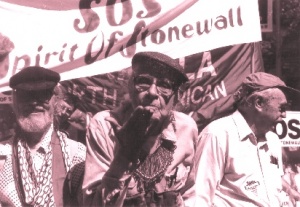
A 2021 journal issue entitled "Restoring Intergenerational Dynamics to Queer History"[18] reminds us that intergenerational love and eroticism represent an integral part of Queer history; before terms like "homosexuality" - once designating same-sex attraction - came to be associated with "androphile" or "adults only." In her book on the once famous and influential pederast Norman Douglas (see book review), Historian Rachel Hope Cleves quotes from Kadji Amin:
- "According to Amin, “modern pederasty,” which he defines as age-differentiated sex, was the dominant form of male same-sex practice until the mid-twentieth century. As he reminds readers:
- Virtually all late nineteenth- and early twentieth-century canonical authors now remembered as “gay” — including Walt Whitman, Oscar Wilde (whose famous “love that dare not speak its name” was pederasty), Marcel Proust, Jean Cocteau, André Gide, Jean Genet, and even James Baldwin — participated in and, in some cases, wrote about age-differentiated same-sex erotic relations"[19]
In their book chapter "Same Sex, Different Ages: On Pederasty in Gay History," Gert Hekma and D. H. Mader survey the history of recorded male same-sex eroticism through surviving photography artwork. They conclude: "The history of pederasty is to a large extent the history of homosexuality, and vice versa". Reflecting on the dire consequences of expansive definitions of "child pornography,"[20] which can include drawings, animation, and any material featuring real-life persons under 18 years of age even if they are not engaged in sexual activity or remotely naked, they note that the mere possession of much material they and other historians discuss has now become illegal - providing a justification to wield state-power to destroy gay history. As they explain, "When the age for “child pornography” rises to 21, a very significant part of the visual history that the LGBT community now celebrates becomes off limit." [21]
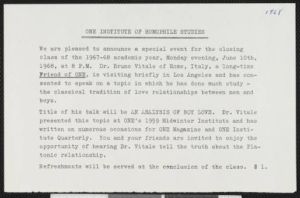
In the American Homophile movement, One Institute (f. 1952 as ONE Inc.) published the nation's first wide-circulated, national homosexual periodical ONE Magazine. ONE's writings and speaking events are known to have included pederasty / boy-love, as with the (pictured) example of Dr. Bruno Vitale, a "Friend of ONE" who had "presented this topic at ONE's 1959 Midwinter Institute and has written on numerous occasions for One Magazine and One Institute Quarterly." ONE also assisted in creating The Ladder, a magazine published by the first lesbian civil and political rights organization in the United States - the Daughters of Bilitis (f. 1955) - who named themselves after the Ancient Greek character Bilitis from Pierre Louys' Sapphic/pederastic poetry collection The Songs of Bilitis (1894). After emerging from a Mattachine Society discussion held on October 15, 1952, the One Institute is now considered the oldest active LGBTQ+ organization in the United States.[22]
Keith Vacha, a gay writer whose work appeared in Fag Rag, interviewed over 100 homosexuals from the pre-Stonewall generation (born around 1900) for his book Quiet Fire, and noted "a high degree of inter-generational relationships among the men I met" (Quiet Fire, 1985, p. 217). On the basis of his interviews, Vacha attributed this tendency "not so much to preference as to their lack of hesitancy in entering into such age-segregated relationships. The stigma against these kinds of relationships does not appear to be as strong in the gay community as it is in society in general. (pp. 217-218).
Homosexuality (including pederasty) remained illegal and strictly taboo until the liberation movements of the 60s. With effectively no age of consent for homosexuality, the movement was age-queered as inter-generational sex was no more illegal than same age homosexuality. Witch-hunts such as the earlier Boise controversy targeted pederasts in the name of curbing homosexuality - since the homosexuals were largely pederasts. Boy prostitution was also common form of homosexuality in this intervening period, with many such examples[23] documented. Some of our man-boy accounts and testimonies also refer to this revealing period in time.
1969: The Stonewall Myth
Stonewall Inn, NY, 1969: Research has revealed the presence of underage rent boys and street kids at Stonewall, a joint known for its lax door policies; cultivating a collection of underage hustlers, drag queens, transsexuals and ailing pederasts.[24][25][26][27][28][29][30] There was a network of corruption involving the Feds and the Mob, who exploited this consensual trade in underage boys, using it to extort Wall St traders and others. The bars, many of which were frequented by hookers aged 14-18+ (the more mature end of the boy trade in New York[31]) were generally run by the Mob, and would pay the Feds off with money raised via this extortion racket/pleasure-boy trade. When said financial relationship broke down (or when politicians and officials were seeking to promote themselves as champions of Law and Order), raids occurred - as was common with sex shops, brothels and bars of that era. London's Soho gay village had a so-called "meat rack" of boys as young as 10, much like the major American cities.
A few accounts from Stonewall follow:
- "Bob Kohler used to talk to the homeless youth in Sheridan Square and said, "When people talk about Judy Garland's death having anything much to do with the riot, that makes me crazy. The street kids faced death every day. They had nothing to lose. And they couldn't have cared less about Judy. We're talking about kids who were fourteen, fifteen, sixteen. Judy Garland was the middle-aged darling of the middle-class gays. I get upset about this because it trivializes the whole thing."[32]
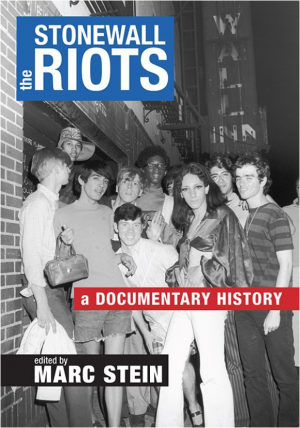
- "The crowd was young, some of them very young, the Stonewall being known for its underage crowd. In fact, it turned out that the purpose of the raid was to bust a Mob blackmail ring being run out of the Stonewall. The Mob was using underage hustlers to entrap older gay men, mainly from Wall Street, and extract money from them." - (Personal Account, Lucian Truscott).[33] He has described them as between 15 and 17[34]
- "In Stonewall’s heyday you had underage hustlers, people selling drugs, and it was really a seedy place,"[35] According to Carter, historian and author of Stonewall: The Riots That Sparked the Gay Revolution, the “hierarchy of resistance” in the riots began with the homeless or “street” kids, those young gay men who viewed the Stonewall as the only safe place in their lives.[36][37]
It is a gross simplification to present the riots as a crystallizing moment rooted in a conscious political sea-change.[38] We know there was already decades of organizing and a widespread feeling of resentment towards law enforcement. Yet we also know the street kids and transvestites who were seen to fight back probably had nowhere to return to that early morning, and acted for reasons other than immediate political demands. Nevertheless, within a month of Stonewall, some radical youth organizations such as the youth wing of NACHO were already calling for the abolition of ages of consent, among other demands.[39][40][41]
In his article "When Gays Wanted to Liberate Children" (2018), Michael Bronski explained:
"In his foundational “The Gay Manifesto,” published a month before the Stonewall riots, Carl Wittman wrote:
- A note on the exploitation of children: kids can take care of themselves, and are sexual beings way earlier than we’d like to admit. Those of us who began cruising in early adolescence know this, and we were doing the cruising, not being debauched by dirty old men [...] And as for child molesting, the overwhelming amount is done by straight guys to little girls: it is not particularly a gay problem, and is caused by the frustrations resulting from anti-sex puritanism.[42]
1970-1994: Age-queer foundations of the modern LGBT movement
The modern gay movement was age-queer from the beginning (not without assimilationist tendencies, it represented a broad and sometimes fractious church). This is demonstrated by the foundation of gay youth groups immediately after Stonewall, and their policy platforms. New York's Gay Youth, for example, lobbied for the complete removal of ages of consent.[43] What is also striking about these youth groups, is how they viewed Boylovers (Chickenhawks) as a means to an end. The 1972 Gay Rights Platform, created at the National Coalition of Gay Organizations Convention held in Chicago in 1972, demanded at a state level, "repeal of all laws governing the age of sexual consent".[44] That same year, members of Boston’s Gay Men’s Liberation lobbied the Democratic National Convention for the complete abolition of parental rights, adding that "free twenty-four hour child care centers should be established where faggots and lesbians can share the responsibility of child rearing".[45] Abolitionism wasn't just limited to the US. London's Gay Youth Movement[46] explicitly supported pedophiles, and Gay Liberation Front & its youth wing marched in favor of repealing the Age of Consent[47], and the following excerpt from Radical History Review, suggests similar movements were seen in Canada:
- "Certainly, youth liberation was understood to be part of the gay movement. A 1973 editorial in TBP stated, “At the centre of the Gay Liberation Movement is the whole burning question, which we cannot ignore, of sexual rights for gay youth and youth in general.” A few years later, Fiona Rattray, then a young member of LOOT, penned a positive review of Growing Up Gay, a 1976 anthology published by the Youth Liberation Press, a wing of the Ann Arbor-based Youth Liberation Organization. Founded in 1970, the youth-led YLO included in its fifteen-point program the “unhindered right” to “sexual self-determination.” [...] At a national [Canadian] gay conference in 1975, two young lesbians, in a shrewd demonstration of youth power, told delegates over the age of twenty-one that they should vote on the age-of-consent issue based on the wishes of those under twenty-one. All the youth delegates were in favor of the outright abolition, not just equalization, of the age of consent. While the issue never achieved complete consensus in the movement, the National Gay Rights Coalition, like many of its member groups, including TBP, adopted as part of its platform the abolition of all age-of-consent laws. [...] In the 1,000-strong march up Toronto’s main drag in January 1978 to protest Anita Bryant’s visit and to defend TBP, protesters chanted, “Women and Gays and Children Unite: Same Struggle, Same Fight.”"[48]
Elsewhere, gay historian Bronski notes how, "In 1972 members of Boston's Gay Men's Liberation, one of the most significant Gay Liberation groups formed after the 1969 Stonewall riots, drove to Miami to hand out a ten-point list of demands at the Democratic National Convention. [...]
"Its first demand [...] was for "an end to any discrimination based on biology. Neither skin color, age nor gender should be recorded by any government agency. Biology should never be the basis for any special legal handicap or privilege."
It's 6th demand:
- Rearing children should be the common responsibility of the whole community. Any legal rights parents have over 'their' children should be dissolved and each child should be free to choose its own destiny.[49]
In France, the early LGBT rights advocate and founder of queer theory Guy Hocquenghem - referred to as "a founding father of homosexual liberation in France" - had a lifelong relationship with his then high school philosophy teacher René Schérer, which had began as an affair when Hocquenghem was 15 years of age. Hocquenghem participated in the May '68 student revolt and published a coming out essay in January 1972 entitled the "Revolution of Homosexuals", described as "the literary event that, probably more than any single other, helped establish the cause of gay liberation firmly in the wider public consciousness."[50] He was prominent member of the Front Homosexuel d'Action Révolutionnaire (FHAR), which opposed the age of consent, and signed and defended the French Petition against Age of Consent Laws[51] signed by many of the most influential thinkers of the 20th century, including Michel Foucault and founder of 2nd wave feminism Simone de Beauvoir. In Sexual Morality and the Law[52] (1978), a radio discussion alongside Michel Foucault and Jean Danet, Hocquenghem famously stated:
- "As far as this question of consent is concerned, I prefer the terms used by Michel Foucault: listen to what the child says and give it a certain credence. This notion of consent is a trap, in any case. What is sure is that the legal form of an intersexual consent is nonsense. No one signs a contract before making love."
Queer historian Kadji Amin (2017) wrote:
- "During the French gay liberation moment of the early 1970s, male “homosexual revolutionaries” widely accepted that the liberation of pederasts would be the cutting edge of the sexual revolution agenda. As the Groupe de Libération Homosexuelle 14 writes in a 1976 publication, “The fight for the liberation of pederasts . . . is essential, perhaps, more fundamental than that of homosexuals, perhaps even more than that of women. It radically questions all of society; subversion par excellence.” French gay liberationists valued pederasty as a radical challenge to the bourgeois nuclear family, understood to be the fundamental disciplinary unit of a society founded on repressive sex and gender normalization. They theorized pederasty/pedophilia as a crucial means of contesting parents’ possessive investment in their children and of championing minors’ free exercise of their sexuality."[53]
David Thorstad says of the post-Stonewall American group he led:
- "New York's Gay Activists Alliance (GAA), successor to the Gay Liberation Front and a prototype activist group founded in December 1969, opposed legal restrictions on sex based on age, although this was never a focus of the group's activities. In 1976 GAA became the first gay group in New York — and probably in the country — to sponsor a public forum on man/boy love. Held at the Church of the Beloved Disciple on April 4, the forum brought together a "panel of pederasts" to speak on the topic "Of Men and Boys: Pederasty and the Age of Consent." The Canadian Lesbian and Gay Rights Coalition, a cross-Canada group, also favored abolishing the age of consent. Many activists shared the view that the state had no business regulating sex between consenting partners, whatever their age [...] In 1977, the issue of sex between adults and minors moved abruptly to center stage. Anita Bryant began to articulate the mounting backlash to gay liberation by zeroing in on a perceived weak link: the widespread belief that gay men seduce young boys and turn them into queers. The name of her organization — Save Our Children— transparently implied this. Simultaneously, a new hysteria about "kiddie porn" arose, fed by the political right and the feminist movement, with unmistakable suggestions that gay men who loved boys were in reality exploiting and abusing them. This clever propaganda ploy not only deftly exploited the public's ignorance about homosexuality, but also caught the gay movement off guard: It was unprepared to make an intelligent rebuttal."[54]
In 1974, the gay umbrella group ILGA (IGA at the time) is set up. The openly pro-pedophile Ian Dunn is a key founding member, the same year he helped set up the Paedophile Information Exchange.[55] ILGA exist to this day as part of the UN consultative network - running social media accounts as @ILGAWORLD. In 1978, Tom Reeves and David Thorstad - a major inspiration for this article, are already accepted gay activists, but decide to form NAMBLA, an organization dedicated to pederasty, and initially accepted by the gay community[56], soon joining up with ILGA.[57] Between 1975 and 1977, the British Gay Charity, Albany Trust, with help from the Paedophile Information Exchange and the Paedophile Action for Liberation, published a booklet on paedophilia.[58][59]
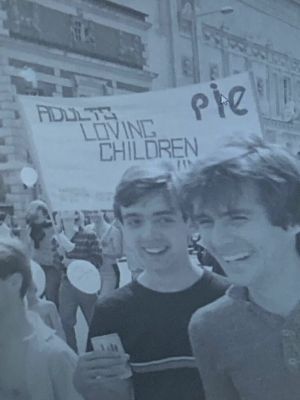
By the late 70s, the nascent NAMBLA (having formed after another witch hunt against pederasts) was already attracting negative attention from some angry Lesbian Feminists and infiltration by the FBI[41]. In 1980, 15-year old Gay Youth Activist, Mark Moffett, who had pursued relationships with older men[60], spoke at a rally in Sheridan Square, defending the right of boy-lovers to participate in the movement.[54] His personal testimony, views on the Age of Consent, and that many other young gay people from around the same time have been compiled in the 2019 Kids Club Anthology (Vol. 1).[61] Vol. 2, She said - Women, Lesbians, and Feminist Speak Out about Youthlove (2019), shows similar accounts and perspectives from females.[62]
American associations between gay and pedophile groups weren't an exception to the rule. Indeed, in the UK, the largest and most influential organisation in the gay rights movement was the Campaign for Homosexual Equality, and they were affiliated with the Paedophile Information Exchange from 1975. In 1977, they hosted their own conference on Pedophilia; leading Dutch pederast Edward Brongersma was invited to talk (see gallery). In 1983, they showed further solidarity with PIE, after they were denied banking services by the Midland Bank (also in gallery). PIE has been involved in further scandals over its past associations with the civil liberties group NCCL (now Liberty) and various former NCCL members who went on to take political office. Two successive 1978-9 copies of Gay Left magazine presented a number of radical takes on pedophilia, including a piece from PIE activist Thomas O'Carroll.[63]
Sweden's Pedophile Working Group was part of the LGBT group Riksförbundet för Sexuellt Likaberättigande - RFSL. In 1983 they sent a petition to the Swedish government demanding Age of Consent abolition, and in 1993 were accused of publishing a guide to child prostitution abroad, after only rejecting the idea of restarting the workgroup due to social pressure. One journalist writes "RFSL explicitly wrote that "the pedophile gives tenderness and love" and that the pedophile should not be considered sick. The man behind these formulations was called Kjell Rindar and was then the confederation chairman of the RFSL. As recently as 2011, he gave the opening speech at Stockholm Pride."[64]
In a recent review, Brussels academic and researcher David Paternotte observes of ILGA, now in its 6th year (1980):
- "The documents of the 1980 Barcelona conference, where pedophilia was thoroughly discussed in two workshops (the women's caucus and a specific one on the topic), reveal that, despite the cautiousness and the already emerging dissent, positions were primarily liberationist. The defence of pedophilia was presented as an issue of solidarity between oppressed sexual minorities and an endorsement of young people's right to sexual autonomy. If the women's caucus raised the issues of power imbalance in sexual relationships, of patriarchy and of institutional violence against women and children, it refused a systematic association between pedophilia and gender violence, stating that mutual relationships are possible between adults and children. Besides, female activists emphasised the existence of 'a link between the repression of (paedo)sexuality and the appearance of repressive sexuality (rape and sexual assaults). [...] A discussion paper prepared by the COC on request of the 1980 Barcelona conference and discussed at the 1981 Torre Pelice conference, which relied on an earlier decision by the COC annual congress (Sandfort, 1987b), confirmed this stance. It urged homosexuals to show their solidarity with pedophiles, particularly because both groups suffer from normative compulsory heterosexuality, and maintains that "a successful homo-emancipation should include pedo-emancipation".
- [...]
- "The pedophilia workshop, which included representatives of some pedophile groups (the German DSAP, the British Fallen Angels and the French Groupe de Recherche pour une Enfance Differente), proposed another resolution suggesting to continue the debate, both within national organisations and at ILGA. Although this document acknowledged tensions and debates within IGA, its preamble was clearly inspired by a liberationist agenda. It claimed that arguments about this topic were often used against ‘homosexual liberation’, emphasised ‘the place liberation of paedosexuality takes in the whole of sexual liberation’, and stressed ‘our distinctive ability, derived from our own experience of oppression as gay men and lesbian women, to contribute to the discussion of the liberation of paedosexuality’. Age of consent laws were condemned, and activists claimed the right to sexual self-determination irrespective of age."[65]
Leading Lesbian Feminist Jane Rule seemed to concur:
- "If we accepted sexual behaviour between children and adults, we would be far more able to protect children from abuse and exploitation.”[66]
Lesbian Feminist Kate Millett made similar comments in 1980:
- "one of children's essential rights is to express themselves sexually, probably primarily with each other but with adults as well (...) the sexual freedom of children is an important part of a sexual revolution (...) if you don't change the social condition of children you still have an inescapable inequality".[67]
In 1979, anti-rape feminists in New Jersey won Age of Consent reforms, temporarily lowering it to 13, in an effort to “reduce the number of teenagers in the courts - to reduce the number of teenagers with arrest records.”[68][69]
As part of an internal debate within the gay community, the following is a statement from the Chicago Stonewall Committee, as published in the 26 March 1983 Gay Community News:
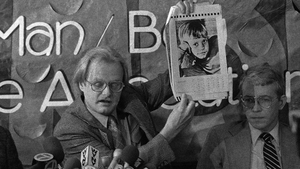
- "We think s/m lesbians and NAMBLA do belong. The gay movement is based on expanding people's options, in bed and out, not on setting some new sexual “party line.” Not too long ago, the whole gay issue was too kinky to be taken seriously as a progressive social movement. In the particular cases mentioned above, NAMBLA and the s/m women were only seeking places to talk about their sexual preferences. We certainly support their right to act on them as well"[70]
Referring to this time, scholar Theo Sandfort observed the fickle nature of the Netherlands' main Gay Advocacy group, the COC. From 1946-1958, they shared in their magazine, pictures of boys (clothed and naked) along with poems and captions professing of the heightened desires these boys aroused in the observer. This was followed by a period of growing separation between homosexuals and pederasts, and then vehement rejection of them all the way into the mid-70s, when standards again relaxed and attraction to minors was viewed in a more positive light. By the 80s, the COC insisted (as noted earlier in our article) the liberation of pedophiles was necessary to the full liberation of homosexuals.[71] Only these statements are now curiously absent from the COC Nederland website, and mixed with misuse and stigmatization of pedophile labelling[72] suggesting a third volte-face.
In American universities at least, the Netherlands' brand of sex-positivity was also being exported. In 1984, at Stanford University, for example, Dutch Criminologist and Lawyer Dr Edward Brongersma spoke openly about man-boy relationships, including those that involved incest. He received a round of applause from the Gay and Lesbian Law Students Association, when he recalled the testimony of a youth whose main takeaway from his relationship with a much older man, was that he "was shown the meaning of love".[73]
In 1984, the Australian Paedophile Support Group was infiltrated by law enforcement. The gay community responded in solidarity, with a positive editorial in Outrage. Queer historian Steven Angelides documented the case of Alison Thorne, then spokesperson for the Gay Legal Rights Coalition, who spoke sympathetically during an interview with Mike Edmonds of Melbourne’s 3aw radio: "paedophiles really care for children. Paedophiles would absolutely abhor child ... abuse of children, are really concerned about consent." Usenet (early internet) archives are available from around this time, reflecting a variety of takes among the gay community.[74]
Thorstad comments further:
- "NAMBLA's October 1984 convention in San Francisco's Pride Center included a public panel discussion on "Man/Boy Love and Sexual Liberation" with Mattachine Society founder Harry Hay; Jim Kepner, curator of the International Gay and Lesbian Archives in Los Angeles; Morris Kight, long-time gay rights and social activist from Los Angeles; Jes Harrison, a 16-year-old gay youth; and me. The participation of Hay, Kepner, and Kight was welcome support from activists whose credentials went back to the beginnings of the U.S. gay movement."[54]
At its 1985 conference in Toronto ILGA voted for members to "lobby their government to abolish the age of consent law" in its position on "Age of Consent/Paedophilia/Children's Rights".[75][76] As NAMBLA's Bill Andriette recalls:
- "But the IGA nearly passed a resolution that would have sounded like music to any NAMBLA member's ears. As first conceived by the IGA youth section, the resolution called for the abolition of age-of-consent statutes. But under feminist pressure that was changed to a call for the equalization of ages of consent for gay and straight sex, and the eventual abolition of such statutes when young people were deemed sufficiently protected from abuse. NAMBLA's was the lone dissenting vote, but even in its compromised state the resolution is supportable."[77]
Andriette describes in an ILGA Bulletin the following year (see gallery), how positions were and had been "generally sympathetic to man/boy love". He goes on to describe an international pedophile conference adjacent to ILGA's main event as its "little brother", and explains how the groups had set up a "pedophile information pool". However, in 1986, NAMBLA were also excluded from marching in an LA pride parade - an exception to the rule, as they had been present in parades since 1979, for example, being seen in a video at SF in 87'.[78][79] Gay liberation pioneer Harry Hay protested this decision, arguing that NAMBLA's exclusion was “an affront to the whole process of gay liberation,” because it was undemocratic: it was not the place of the parade organizers to “arbitrarily decide who are members of the gay community and who may speak.”
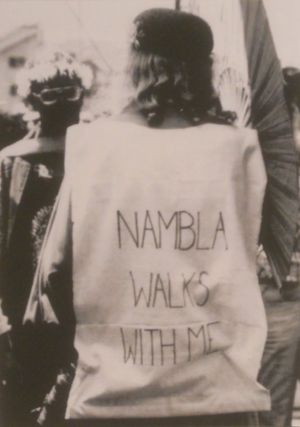
In 1986 Germany, Gay groups were still widely appreciative of Boy-lovers. Schwules Gay Museum Curator Birgit Bosold spoke to journalists in 2023 regarding an exhibition documenting these now embarrassing associations. Sources stated "for a long time there had been close cooperation between the gay and lesbian movement and pedophiles. As late as 1986, a poster for Christopher Street Day in Munich named lesbians, gays and pedophiles as equal emancipating minorities. Only in the 1990s and under the impact of the HIV pandemic did people distance themselves".[80] In 1988, as the German VSG point out in page 7, L8 of their response (in gallery), the ILGA passed a resolution at their annual conference, recommending that the now embattled pedophile member groups twin with non pedophile member groups for "both moral and political support". These attempts to encourage twinning of groups persisted well into the 1990s, as our scans of their Bulletin reveal. The 11th Annual ILGA Conference in Vienna in 1989 also hosted a pedophile workshop. Minutes (in the gallery below) reveal that many were in favor of eliminating Age of Consent laws entirely, and then asked “Should the Pedophile Workshop ask the scientific community to design unbiased research on consent, how it develops in children, and what cross cultural, educational, developmental, and sex differences exist in the ability to consent? […] Some expressed distrust and contempt for the “scientific community” because of the tremendous damage it has done to the self-esteem of pedophiles.”
Principled support for pederasts in the Gay Movement was evidently fading, but could still be seen in organizations like ILGA, and personalities such as ACT-UP's Larry Kramer:
- "In those cases where children do have sex with their homosexual elders... I submit that often, very often, the child desires the activity, and perhaps even solicits it, either because of a natural curiosity... or because he or she is homosexual and innately knows it. ... And unlike girls or women forced into rape or traumatized, most gay men have warm memories of their earliest and early sexual encounters; when we share these stories with each other, they are invariably positive ones."[81]
In October, 1991, ILGA used their bulletin to publicly call out Vereniging MARTIJN among other organisations for not paying their membership fees. In 1993, Francesco Vallini, who was a journalist at the gay magazine Babilonia, and ten others associated with his pedophile activist organization Gruppo P were arrested. At the time, the magazine's editorial staff defended him. The group published the bulletin Corriere del pedofili.[82] The worsening relationship between NAMBLA and the LGBT Movement is captured in the documentary: Chicken Hawk.[83]
In 1993/4, only 9 years after supporting the abolition of ages of consent, ILGA were embroiled in a public controversy regarding their consultative status with the UN. Paternotte observes, that after gaining a roster consultative status within the UN, Christian Right attacks against the ILGA were fierce, causing them to make the following clarification:
- "Debate about paedophilia, as well as about other complex issues regarding sexuality, has been ongoing for a long time, both within and outside the ILGA. The ILGA has therefore called upon its members to treat all sexual minorities with respect and to enter into a dialogue with them. Neither in the ILGA or in scientific circles has a consensus about the issue, which has caused and still causes considerable controversy, been reached. It is therefore important that discussion can continue in an open and respectful manner, which takes into account the feelings of all parties involved."
Inauthentic assimilationists eventually won those internal battles in 1994 with an about-turn 214-30 vote at the ILGA World Conference in New York,[65] and the "pedophile organizations" NAMBLA, Project Truth/Free Will, and Martijn were thus ejected. NAMBLA itself was an early member and on some occasions its only representative from the US. On the hypocrisy, NAMBLA pointed out:
- "We've been continuously active in ILGA longer than any other US organization. NAMBLA delegates to ILGA helped write ILGA's constitution, its official positions on the sexual rights of youth, and its stands against sexual coercion and corporal punishment. [...] Already, several ILGA activists and member organizations have condemned the secretariats' actions and reaffirmed their support for the participation in ILGA of man/boy lovers. The national German gay coalition Bundesverband Homosexualitat has declared that it is "astonished and embarrassed" at the secretariats' actions. "We are convinced that any attempt to expel NAMBLA and others from ILGA will be rejected by the vast majority of ILGA members," writes BVH executive committee member Wolfram Setz. Another German group, Verein for Sexuelle Gleichberechtigung adds, "The fight for... fundamental human right[s] must not be relinquished or reduced because of the political pressure from any government. Where would we end up if we made concessions in this respect? NAMBLA's objectives are as far we know absolutely in agreement with... the UN declarations of human rights and children's rights.""[84] Usenet archives again reveal considerable dissent against the drive to remove NAMBLA from the umbrella.[85]
The expedience and western-bourgeoise underpinnings of the 1994 decision are starkly revealed by the nature of responses from member organisations in the 1994 May-Jun Bulletin. Israel and other Western-aligned countries are particularly elaborate and vociferous in their denunciation of the pedophile groups, while nonwestern members issue short statements of obligatory agreement, disapproval, and even requests for clarification as to what the issue entails. Richard J. Rosendall was particularly animated in an article distributed via numerous gay newspapers, and to voters at the 1994 conference:[86]
A common thread running through this material is an utter inability to recognize a conflict of interest. These men really seem to believe that they have the boys' best interests at heart, despite clear evidence from their own accounts that they are taking grotesque advantage of troubled boys' need for love, attention, support, and freedom from abuse. Their subtler form of abuse directs an adult's arsenal against the innocence of children and the nascent sexuality of young adolescents and, when it succeeds, calls the result consensual love. [...] Who among us has never said of a lovely child, that one is destined to break a few hearts? This should cause us to treasure and respect childhood, not to steal it with the seductions and subtle power plays of unrestrained adults behaving like Jupiter engulfing Semele. In that myth, it was Semele who insisted upon seeing Jupiter in all his glory. But that did not excuse Jupiter, who knew that such a revelation would overwhelm the mortal he claimed to love. [...] Those who consider ILGA's breakthrough toward visibility and participation in the U.N. "a meaningless symbol of their own self-importance" clearly do not comprehend the magnitude of ILGA's opportunity to advance the cause of Gay and Lesbian civil rights in the world. Anyone who would throw that away deserves the company of the self-serving denizens of NAMBLA.
In 1995, ILGA then demanded that member organizations either sign a letter of confirmation endorsing the expulsion of the former members, or themselves be ejected. This caused the Pink Triangle Press to resign in protest, although they would rejoin in 1998. After this incident, ILGA would ironically take over a decade to achieve UN consultative status, and have since released a series of highly misleading statements such as:
- "ILGA does not advocate – and never has advocated – paedophilia [...] The ILGA conference (the highest decision making authority) has passed a resolution categorically rejecting any attempt to promote or legalize paedophilia."[87]
ILGA have thus in effect confirmed the fact their "highest decision making authority" previously voted for the abolition of the age of consent in a vote on "pedophilia". In reality, most people connected with the gay literature business will be well aware, that for over a decade after 1994, gay book shops continued to sell boy-related material, such as Azov Films material - in the instance of Amsterdam's Intermale, which closed in 2011.
By 1998, virtually all human sexuality textbooks exhibited a politically-correct revisionist approach to documenting the history of homosexuality. Man-boy practises were documented, but were co-opted in support of modern man-man homosexuality, a form that was at the very least, less well documented throughout history, if not less common. Bruce Rind analyzed various texts in the same year.[88] One surprising fact about NAMBLA and their (un)acceptability, is that until 2000, Peter Melzer (a key member of NAMBLA) still held a post at Bronx High School of Science, albeit at the district office following a 1993 media expose and protracted legal dispute.[89]
Gallery of files
-
"Off the consenting adults bullshit!" says gay newspaper in 1969.[6]
-
Cohen: NY's Gay Youth Group - AoC Repeal 1972[43]
-
Cohen: NY's Gay Youth Group - AoC Repeal 1972 (2)[43]
-
Cohen: NY's Gay Youth Group in 1974 - Attitude to Chickenhawks[43]
-
26th August 1975: Child-lovers win fight for role in Gay Lib (The Guardian)[90]
-
CHE Support PIE in 1977
-
Jane Rule in 1979
-
May 1978 advert for a gay youth conference in The Body Politic (Canadian magazine)
-
Cohen: NY's Gay Youth Group in 1980 - Mark Moffett[43]
-
CHE Support PIE in 1983
-
Andriette in the 5th ILGA Bulletin of 1986
-
Andriette continued
-
Andriette further comments in NAMBLA Bulletin
-
Alison Thorne incident recalled in the 5th ILGA Bulletin of 1986
-
ILGA's Pedophile Workshop minutes from 1989
-
Celebrated Lesbian Feminist, Chris Bearchell in 1989
-
Continued Pedosexuality references and Twinning in a 1992 ILGA Bulletin
-
NAMBLA seeking a twin in the 3rd 1992 ILGA Bulletin
-
Fuck the Age of Consent! - In Lesbian & Gay Freedom Movement, Winter 1993.
-
Israel right-on with anti-youth language in 94 (May/Jun ILGA Bulletin)
-
VSG Feb 1995 response in ILGA Bulletin (1)
-
VSG Feb 1995 response in ILGA Bulletin (2)
-
VSG Feb 1995 response in ILGA Bulletin (3)
-
VSG Feb 1995 response in ILGA Bulletin (4)
-
VSG Feb 1995 response in ILGA Bulletin (5)
-
VSG Feb 1995 response in ILGA Bulletin (6)
-
VSG Feb 1995 response in ILGA Bulletin(7)
-
Letter from Peter Tatchell
-
Pink Triangle Press rejoins ILGA - with details of ILGA demands in 1995 (Jan 1998 ILGA Bulletin)
-
LGBT identitarian peak insanity in 2021
Supportive and ambiguous gay icons
In addition to the various established gay activists who went on to form pedophile/pederast organizations within the LGBT movement, and pioneers of the gay press, others are still openly celebrated by the mainstream:
- Jane Rule and Kate Millett (discussed in this article) were Lesbian Feminists who supported the rights of children to pursue intergenerational relationships.
- Alan Turing - Idolized as a gay hero, however his relationships and interests strongly suggest that he was also a MAP (Boy Lover).[91]
- Harvey Milk - An icon of the modern LGBT community, Milk was an early pro-LGBT U.S. politician who became a gay martyr after he was killed. Milk has a public holiday dedicated to him in California, an airport and Navy vessel named after him, his image on postage stamps, and was awarded the Presidential Medal of Freedom as a symbolic gesture by President Obama in 2009. A biographer of Milk's states that Milk had his first sexual experience with a man at 14 years of age, and "always maintained [...] about those early sexual contacts[,] that he had not been molested, because they were exactly what he had been anxiously looking and hoping for. He had had homosexual feelings ever since he could remember".[92] Milk is known to have entered a sexual relationship with runaway hustler Jack Galen McKinley, who had just turned 17 at the time, whilst Milk was 33 years-of-age and served as a father figure/mentor role for McKinley.[92] A personal friend of Harvey's said he "always had a penchant for young waifs," and Milk is alleged to have had sexual contact with people below 15 years-of-age, whilst the known case of Jack McKinley alone would already make Milk guilty of statutory rape in U.S. states which venerate him (e.g. California) where the age of consent is 18.[93]
- Oscar Wilde - Jailed for sex with boys.[94] See also, Uranian Poetry and the upper-class homosexuals who pursued it. Authors such as Walt Whitman and others mentioned further up in the article.
- Andre Gide - French author, pederast, and winner of the Nobel Prize in Literature in 1947.[95] His book Corydon[96] is considered a classic defense of homosexuality and pederasty, which, at that time, were not considered to be rigidly distinct. The New York Times described Gide as "France's greatest contemporary man of letters" and "judged the greatest French writer of this century.[97]
- Simone de Beauvoir, Michel Foucault (a key founder of Queer Theory) and other gay/bi signatories of the French Petition against Age of Consent Laws.[98]
- Wilhelm von Gloeden - This much-celebrated photographer of boys had a 14-year old lover, and seems to have escaped censure. Copies of his work being present in the homes of many mature gay men.
- Hajo Ortil - A dumbfounding example of a German Naturist pederast who was celebrated throughout his life and posthumously.
- Harry Hay - Radical Faerie, loved boy, pederasty supporter and founding member of the modern gay movement. Famously declared "NAMBLA walks with me".[99][100]
- Jim Kepner - Gay activist pioneer, who was overtly inclusivist towards Boy Lovers.[101] Founder and curator of the International Gay and Lesbian Archives (Los Angeles), which has recognized the contributions of many NAMBLA activists. A longtime gay activist, Kepner recalled that “half of gay history is pedophile history.”[102][103]
- Charles Shively - Gay history professor who argued for Walt Whitman as a pederast / boy-lover. Driving force behind the Fag Rag Collective, he worked closely with NAMBLA founder Tom Reeves and published the gay journal Fag Rag, which supported "what it characterized as adolescents' right to sexual freedom, as well as consensual sex between adults and children".[104]
- Larry Kramer - HIV-AIDS Activist, as detailed above.
- Guy Strait - Strait founded the first gay newspaper in San Francisco in 1961, and co-founded one of the 1st U.S. gay organizations, the League for Civil Education. Radical pro-sex queer who went into business producing pornographic films, and was arrested multiple times throughout life on claims that he had "cornered the market on the production of 'kiddie porn'".[105]
- Allen Ginsberg - Famous, much beloved poet and pederast.
- Ian Dunn mentioned in this article.
- Nettie Pollard - British Lesbian Feminist Civil-Liberties campaigner.[106]
- Peter Tatchell - His positions have at times been very supportive.
- Eric Presland - British gay writer, cabaret artist and founder of the Homo Promos theater company. Presland has authored unapologetically supportive pieces in The Age Taboo (1981) and The Betrayal of Youth (1986).
- Ken Popert[107] and Gerald Hannon - Key figures within the Pink Triangle Press - a highly successful commercial venture that now counts the gay dating site Squirt.org among its subsidiaries. Wrote and published the highly controversial article Men loving boys loving men. They were in turn supported by Gayle Rubin.[48]
- Carl Wittman - In what Wikipedia declares "one of the most influential gay liberation writings of the 1970s", the San Fransisco gay activist called for youth liberation in his Gay Manifesto, offering that many gays were cruising for sex from their early teens, not being molested by elders.
- Rosa von Praunheim - German filmmaker who gave a sympathetic interview which platformed NAMBLA founder Tom Reeves. Praunheim's works influenced the development of LGBTQ+ rights movements worldwide, with his 1971 film It Is Not the Homosexual Who Is Perverse, leading to many gay rights groups being founded and thus began the modern gay liberation movement in Germany and Switzerland.
- Volcker Beck - German politician who penned the 1988 essay: "Amending criminal law? An appeal for a realistic, new orientation of sexuality politics", promoting the decriminalization of "pedosexuality". He has since distanced himself from his previous writings.
- Bill Dobbs - The Gay Activist who organized a pro-BL marching group, moderating a meeting at the Stonewall Inn in 1994.[108]
- Any number of international gay figureheads who signed a petition to support NAMBLA's continued right to march in the 1990s.[109]
- Hubert Kennedy
- Samuel R. Delany has shown support for NAMBLA.[110]
- Publishers such as Pink Triangle Press, Spartacus, the later Destroyer Journal and Milo Yiannopoulos controversy, all showing a symbiotic relationship with boylove, bring us up to date.
Prominent gay people who speak from experience
Gay celebrities such as Stephen Fry[111] and Elton John[112] recall stories of early encounters or yearning in their youths. Fry clearly shows a depth of knowledge on the subject, and Elton wishes he had been "molested" just for the experience. Scotty Bowers - Bisexual, and fixer of Hollywood film Actors' sexual trysts, was unequivocal about his positive experiences with men from a very early age, and these included sex work. Many similar examples exist, and they are not hard to find:
- Tom Driberg - Gay Activist Politician.
- Guy Hocquenghem - Founder of Queer Theory.
- John Mitzel - Gay Activist.
- William Percy - Gay Historian.
- Ivo van Hove - Arts Figure.
- Beth Kelly - Academic.
- Scott O'Hara - Porn Actor.
- Jane Rule and Chris Bearchell - Lesbian Feminists.[48]
LGBT Hypocrisy
- For more examples of how gay culture erases Pederasts and Youth Erotica from its history, see Rainbow Revisionism.
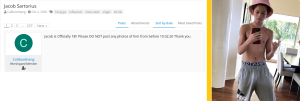
The LGBT movement is not so much a "community" these days, but an expedient political lobby.[113] It is very easy to identify internal contradictions, cynical strategies and realpolitik when one assesses the state of the modern movement.
- "One obvious contradiction in the assimilationist position is that if homosexual identity is inborn, as they say, then why do they oppose freedom of sexual expression for minors? Assimilationists argue that sexual identity is fixed by age six, but they deny young people the right to enjoy sexual pleasure with the person of their own choice." - David Thorstad.[17]
Thorstad also opines:
- "The struggle for sexual liberation has been diluted by a focus on dozens of fanciful and questionable genders and has resulted in a virtual erasure of gay males and lesbians," [Thorstad said in an interview before the Stonewall 50 march in 2019, explaining why he wasn't going] "Sex is not even part of the alphabet-soup vocabulary. Highlighting victimhood is in. Instead of fighting social injustice, the LGBT goal is to assimilate into a heterodominant capitalist system, aping its failed institution of marriage, promoting monogamy (a bit player in the mammalian heritage), and espousing patriotism, militarism, and conventionality."[114]
Kathleen Stock:
- "Should a sexual libertarian [by implication, Tatchell - Ed] ever go rogue and overdo the transgression (say, by claiming that “children have sexual desires at an early age”), [queer] bureaucrats will instantly appear in reassuring mummy-mode to steady the horses, talking soothingly about best international practice and strong safeguarding policies…"[115]

However, pederasty didn't suddenly disappear the moment a taboo was placed on it. A perfect example of this is how gay men fetishize "straight boys" in the porn industry, or the feeding frenzy that ensues on user-shared porn sites such as LPSG, whenever a boy celebrity turns 18. The resulting search among users is invariably for self-shot/leaked photographs of the young male's preferably erect penis. While "gay for pay", "straight boy" models are over the age of 18, these tend to be scenes in which young "straight" males are cast as inexperienced and juvenile in character. The producers are thus "taking advantage of boys" by tricking them or using money to have their way with them. The relative popularity of this type of content in the gay porn industry is sometimes seen as "displaced pederasty" or at least a hangover from the "seedy" sex trade in boys that received so much attention in the 1970s before fading out. This argument can be further extended to the many "equal" gay relationships in which there is a clear "man" and "boy", unequal power differential,[117] and indeed kinky gay expressions such as slavery, chastity bondage and dogs on leashes. Taken together, this tells us that the spirit of pederasty never really left the gay world. Only, the "boy" lives on as an archetype we are allowed to fetishize and trivialize, but seldom accept as a more meaningful object of desire.
- In 1994, LGBT figureheads were already mythologizing Stonewall and its (as documented earlier, pro-pederast) legacy: "Last month, a New York group called Stonewall 25 voted to bar the controversial North American Man-Boy Love Association from its international march on the United Nations on June 26. The demonstration will commemorate the 25th anniversary of an uprising at the Stonewall Inn, a Greenwich Village gay bar. ″Those who advocate or engage in sexual abuse of young people are not welcome in the family of gay men and lesbians who live upstanding and honorable lives,″ said Pat Norman, a co-chair of the march."[118]
- Modern gays have often attempted to reclaim the history of pederasts such as Wilde and ignore evidence concerning others such as Turing. One example of this rewriting of history is the gay New York Times journalist, Anthony Tommasini describing Franz Schubert's reported partners as "adolescent men", a category otherwise unheard of in any form of commentary or analysis.[119] In another, a famous book by John Addington Symonds (in effect, a treatment of Pederasty), was recalled as "promoting the morality of same-sex relations".[120] The piece contains the first known mention of the term boylove.
- See for example, the rise and rise of IPL (Intense Pulsed Light) laser hair removal devices and other methods among the same class of mature gay men who distance pederasts, as an example of hypocrisy. Removal of hair from the perianal area is intended to attract (via "dating" apps) the same bisexual and "straight" men who are attracted to boyish or androgynous features, and do not like giving oral or penetrative sex to other hirsute males.
- More recently, it has been a daily occurrence on social media to see LGBT, Social-Justice oriented persons relentlessly and obsessively badgering MAP-receptive or adjacent opponents to declare whether or not they are "pedophiles". Within these groups, the idea of pressuring a person for potentially compromising details about their personal life is anathema, when applied to transsexuals and other minorities.
Examples of tolerance outside of the LGBT community
While the LGBT community is not without its expedient tendencies, others (many of them academics such as Alfred Kinsey, married with children, but posthumously thought to be a bisexual) have taken principled stands. Activists such as John Holt[121] supported the sexual rights of youth, and were followed up by ASFAR and NYRA[122]. The UK Communist Party supported abolition all the way up to 2021.[123] Even allies of NARTH have taken positions on pederasty/pedophilia far more liberal than the modern LGBT lobby:
Michael Wertheimer is the son of the late Max Wertheimer, one of the founders of the Gestalt school of psychology. He is a Harvard-educated experimental psychologist, a retired full professor at the University of Colorado, and the author or editor of approximately forty psychology books, as well as several hundred articles. He specializes in the history of psychology. [...] Dr. Wertheimer is in sympathy with NARTH, in that he strongly supports the right to sexual-reorientation treatment. However he holds a another, postmodern theoretical position that is representative of many psychologists today: that concepts of psychological health and disorder are largely socially constructed, rather than objectively true or false. Even pedophilia is not, he believes, necessarily a disorder. [...] "I know of no convincing evidence that even pedophilia is harmful to the boy."[124]
Bizarrely, it is likely that the late Enoch Powell - famous for his right-wing politics, was a closeted homosexual. He was indeed a pioneer in liberalising the laws against homosexuality, a married man, and most probably a dabbling pederast.[125]
References
- ↑ Explanatory Note: 2SLGBTQQIA+ has been endorsed by Justin Trudeau (see gallery) during his time as Prime Minister of Canada. It has become a culture war cliche, to refer to the ever-expanding list of letters and symbols in the LGBTQ+ acronym. Is it a co-incidence that these new inclusive caveats have arisen after the point at which pedophiles were excluded from the umbrella?
- ↑ Fact check in which inaccurate/since debunked claims about the MAP Flag and the Gay Movement's history with pedophiles are repeated, and the representative of a Gay Advocacy organization accuses MAPs of being "disordered" and inhuman.
- ↑ Jenkins, Philip (2006). Decade of Nightmares: The End of the Sixties and the Making of Eighties America. Oxford University Press. p. 120
- ↑ Schwules Museum: on Distancing "pedoactivists" and their history with the Gay Movement
- ↑ Walker, A. (2019). “I’m Not like That, So Am I Gay?” The Use of Queer-Spectrum Identity Labels Among Minor-Attracted People, in Journal of Homosexuality, 67:12, pp. 1736-1759.
- ↑ 6.0 6.1 While MAPs often struggle to disclose their attractions to friends and family, LGBT individuals and other queer communities continue to have these struggles as well. Even with this and other commonalities, however, MAPs are not generally accepted by queer communities. This was not always the case. Multiple researchers have explored ties between gay rights organizations and MAPs lasting from the 1960s and declining until, in some cases, the early 1990s (Chenier, 2008; Janssen, 2017; Paternotte, 2014; Thorstad, 1991). Thorstad (1991) quoted a 1969 article in a gay newspaper as saying, “‘Off the consenting adults bullshit!’” (p. 251). He added, “the Stonewall Generation [...] affirmed the joys of an outlaw sexuality in the face of the outmoded moral norms of the dominant society,” (p. 252), showing acceptance of individuals with attractions to minors. (Ibid, p. 4).
- ↑ BoyWiki: John Addington Symonds
- ↑ See the work of Charles Shively. See also, Jeremy Lybarger, Walt Whitman’s Boys (Boston Review, May 30, 2019).
- ↑ In Jan 2023, the Wikipedia page for Symonds stated: "The work, "perhaps the most exhaustive eulogy of Greek love," remained unpublished for a decade, and then was printed at first only in a limited edition for private distribution. Although the Oxford English Dictionary credits the medical writer C. G. Chaddock for introducing "homosexual" into the English language in 1892, Symonds had already used the word in A Problem in Greek Ethics." For the full-text of Symond's book, see BoyWiki.
- ↑ BoyWiki - Edward Perry Warren
- ↑ The Indictment of John Purser, Containing Thomas Cannon's Ancient and Modern Pederasty Investigated and Exemplify'd, Edited by Hal Gladfelder, in Eighteenth-Century, 31 (Number 1, Winter 2007), p. 54. Copyright free text available online (external link).
- ↑ Kadji Amin, Disturbing Attachments (2014), p. 117.
- ↑ Wikipedia on Arcadie
- ↑ Amin, Disturbing Attachments (2014), footnote 51, p. 220.
- ↑ Kennedy, H. (1999). The Ideal Gay Man: The Story of Der Kreis. New York: The Haworth Press; co-published simultaneously in Journal of Homosexuality, Volume 38, Numbers 1/2. See p. 1 and especially chapter 9: 'Man and boy' (Sci-hub link).
- ↑ Wikipedia - Der Eigene
- ↑ 17.0 17.1 Pederasty and Homosexuality - David Thorstad, 2003. See also on Newgon.
- ↑ Restoring Intergenerational Dynamics to Queer History
- ↑ Rachel Hope Cleves, Unspeakable: A Life Beyond Sexual Morality (Chicago: University of Chicago Press, 2020) (p. 6)
- ↑ Hessick, 2018
- ↑ Gert Hekma and Donald H. Mader. (2013). Same Sex, Different Ages: On Pederasty in Gay History, in Censoring Sex Research.
- ↑ This last claim is made in Wikipedia, linked above. To learn more about the One Institute from one of its founders and leaders, see Dorr Legg's book Homophile Studies in Theory and Practice (written and edited by Dorr Legg, co-edited by David G. Cameron and Walter L. Williams, One Institute Press / GLB Publishers, 1994).
- ↑ many See, e.g. Greek-Love.com
- ↑ History Extra: Explains door policies and the kind of community at Stonewall
- ↑ Origins: Underage Boys at Stonewall
- ↑ Conde Nast Traveller: "drag queens, hustlers, older men who liked younger guys"
- ↑ AirBNB - Group of underage kids, and more underage at Stonewall
- ↑ Underage and drawn into the riots: "They just wanted the police to lay off"
- ↑ AllThatsInteresting: A favorite with the underage
- ↑ NBC News: More references to underage
- ↑ Drew/Drake - BOY PROSTITUTION IN NEW YORK IN 1968
- ↑ Deitcher, David, ed. (1995). The Question of Equality: Lesbian and Gay Politics in America Since Stonewall. Scribner. ISBN 978-0-684-80030-1.
- ↑ The Night They Busted Stonewall - Lucian Truscott
- ↑ Truscott in PBS
- ↑ David Carter Quoted in Observer.com
- ↑ History.com: Hierarchy of resistance
- ↑ Carter and Marcus: Rainbow of kids. Homeless
- ↑ The Stonewall Riots: A Documentary History, By Marc Stein, 2019
- ↑ NACHO Youth Wing - Abolish AoC
- ↑ Save Our Children
- ↑ 41.0 41.1 Scott De Orio
- ↑ Michael Bronski, When Gays Wanted to Liberate Children, Boston Review (2018).
- ↑ 43.0 43.1 43.2 43.3 43.4 The Gay Liberation Youth Movement in New York: "An Army of Lovers Cannot Fail"
- ↑ The 1972 Gay Rights Platform: Platform created at the National Coalition of Gay Organizations Convention held in Chicago in 1972.
- ↑ When Gays Wanted to Liberate Children - Michael Bronski
- ↑ No 1 June 1981 to no 9 June 1983 are held in the British Library. Issues after 1982 often contain support for the Paedophile Information Exchange (P.I.E.). Issue 10 (Dec 1983/Jan 1984) states ' GYM supports paedophiles' (copy in Hall-Carpenter Archives)
- ↑ Williams, Clifford (2021) Courage to Be: Organised Gay Youth in England 1967-1990. The Book Guild Ltd. ISBN 9781913913632
- ↑ 48.0 48.1 48.2 Radical History Review
- ↑ Michael Bronski, When Gays Wanted to Liberate Children, Boston Review (2018).
- ↑ Ron Haas. (2004). Utopia Aborted: May '68 in the Philosophy of Guy Hocquenghem. French History, Volume 32.
- ↑ Henley - Calls for legal child sex rebound on luminaries of May 68
- ↑ Sexual Morality and the Law - Ipce
- ↑ Amin, Kadji. "Disturbing attachments: Genet, modern pederasty, and queer history. Duke University Press, 2017," p. 23.
- ↑ 54.0 54.1 54.2 Man/boy love and the American gay movement and full text, and [Media:Man Boy Love and the American Gay Movement by David Thorstad.pdf our copy]
- ↑ Gript Piece on Ian Dunn - PIE and ILGA.
- ↑ Boston Magazine: Boy Crazy
- ↑ Lesbians vs Pedophiles
- ↑ Wikipedia: Albany Trust
- ↑ Guardian: Albany Trust controversy
- ↑ The Aftermath of the Great Kiddy-Porn Panic of '77
- ↑ 2019 - Kids Club Anthology - Youth speak out on youthlove
- ↑ She said - Women, Lesbians, and Feminist Speak Out about Youthlove (2019) - on Libgen.
- ↑ See, for example, Gay Left 7, Gay Left 8 and support for activists in Gay Left 10
- ↑ ”Pedofilerna och HBTQ-rörelsens mörka historia” i Det goda samhället, 2019-01-02
- ↑ 65.0 65.1 The ILGA and the question of pedophilia: Tracking the demise of gay liberation ideals, by David Paternotte. See also Pedophilia, Homosexuality and Gay and Lesbian Activism (By Paternotte) in Sexual Revolutions
- ↑ The Body Politic, 1979
- ↑ Sexual Revolution and the Liberation of Children: An Interview With Kate Millett
- ↑ Warren Blumenfeld, “NJ Tackles Age of Consent,” Gay Community News, May 26, 1979
- ↑ Waldron in NYT: A Decade in the Making, the State's First Criminal Code Takes Effect Next Month
- ↑ Who belongs in the gay movement, and who decides?
- ↑ Sandfort, T. (1987). Pedophilia and the Gay Movement. Journal of Homosexuality, 13(2-3), 89–110. doi:10.1300/j082v13n02_08, see also his Man-Boy Relationships: Different Concepts for a Diversity of Phenomena
- ↑ COC NL confuses pedophilia with CSA as early as 2006
- ↑ 'Legal and social aspects of pedophilia: an international perspective.' History Corner 034. Sponsored by GLAS and the Gay and Lesbian Law Students' Association - Don't forget, the interview has a "B side", accessible on the tab below the information tab, as it was recorded on a cassette!
- ↑ Steven Angelides, The Homosexualizationof Pedophilia: The Case of Alison Thorne and the Australian Pedophile Support Group, in Homophobias: Lust and Loathing Across Time and Space, edited by David A. B. Murray (Duke Uni Press: Durham & London, 2009), pp. 64-81. See also, Example Usenet thread, and usenet post.
- ↑ Haggerty, George. Encyclopedia of Gay Histories and Cultures, 2013 Edition.
- ↑ PRD: Expulsion of organizations marked as pedophile from ILGA
- ↑ NAMBLA in Toronto: The notes of Bill Andriette
- ↑ Did NAMBLA march in Gay Pride parades in the 70s and 80s?
- ↑ NAMBLA in Gay Pride Parade - SF, 1987
- ↑ Gemeinsame Ausstellung - Translation - SCOUTING.DE
- ↑ Larry Kramer (ACT-UP) in Reports from the Holocaust, New York: St. Martin's Press, 1991
- ↑ il " gruppo P " reclutava i bambini
- ↑ Chicken Hawk: Men Who Love Boys
- ↑ PRD: NAMBLA Affirms Its Membership in ILGA (December, 1993)
- ↑ 1994 Usenet archive: Roy Radow
- ↑ NAMBLA: Out of the Movement's Bounds
- ↑ ILGA release on 1990s UN Consultative Controversy
- ↑ Rind, B. (1998). Biased use of cross‐cultural and historical perspectives on male homosexuality in human sexuality textbooks. Journal of Sex Research, 35(4), 397–407.
- ↑ PEDOPHILE TEACHER FACES AX AFTER 7 YEARS and Court Rebuffs Teacher Who Advocated ‘Man-Boy’ Sex
- ↑ Guardian scan: Child Lovers win fight for role in Gay Lib
- ↑ YMG: Documentary excerpts from "The Strange Life and Death of Dr Turing"
- ↑ 92.0 92.1 Review of Harvey Milk: His Lives and Death by Lillian Faderman. Quotes passages from Faderman about their relationship; e.g. "Harvey … took him to museums, operas and ballets, and made him feel like he was the only person in the world who mattered.”
- ↑ This video presents useful historical information despite being hostile to Milk and framing him negatively. Ironically, the video's creator ends by contrasting Alan Turing as a respectable (i.e. non-MAP related) gay icon, and seems unaware that Alan Turing likely shared Harvey Milk's attraction towards younger males.
- ↑ Greek Love: Profile on Oscar Wilde
- ↑ Greek Love: Profile of Andre Gide
- ↑ Wikipedia: Corydon
- ↑ Web Archive: AndreGide.org
- ↑ Henley - Calls for legal child sex rebound on luminaries of May 68
- ↑ MPetrelis blog: Harry Hay's support of NAMBLA
- ↑ Hay Interview
- ↑ Kepner, 1984 NAMBLA Conference
- ↑ Jim Kepner - NAMBLA
- ↑ Hubert Kennedy's BL Reviews
- ↑ Jeremy Lybarger, Fag Rag: The 70s paper of gay political revolution. (Columbia Journalism Review, September 11, 2020).
- ↑ For discussion of Strait's relationship to the early gay community, see Mori Reithmayr, Community before Liberation: Theorizing Gay Resistance in San Francisco, 1953-1969 (2022 PhD Thesis, University of Oxford). See especially Ch. 4, Guy Strait and the openness of early homophile theorizing of community.
- ↑ PIE/Nettie Pollard
- ↑ Ken Popert - Wikipedia
- ↑ Spirit of Stonewall
- ↑ Roy Radow of NAMBLA publishes list of signatories
- ↑ NAMBLA: Delany
- ↑ Greek-love.com - Stephen Fry collection of testimony
- ↑ Neil Tennant <> Elton John discussion, Chrislowe.co.uk
- ↑ LGBT: A Dissection By David Thorstad, see backup
- ↑ David Thorstad Obit
- ↑ Kathleen Stock, in UnHerd
- ↑ Noah Bernard (2020): Using Imodium Before Bottoming
- ↑ Rictor Norton, A Critique of Social Constructionism and Postmodern Queer Theory, "Intergenerational and Egalitarian Models," 1 June 2002
- ↑ AP News: Gay Groups Try to Put Distance Between Themselves and Pedophile Group
- ↑ NYT: Adolescent Men
- ↑ Queerty Pederastic Erasure
- ↑ John Holt (Wikipedia)
- ↑ Youth Rights on Wikipedia
- ↑ Wikipedia - British Communists and Archived Demand
- ↑ NARTH.com - Michael Wertheimer interview
- ↑ Village Magazine - Powell, The Guardian - Powell
!["Off the consenting adults bullshit!" says gay newspaper in 1969.[6]](/wiki/images/thumb/Offthe.png/120px-Offthe.png)
![Cohen: NY's Gay Youth Group - AoC Repeal 1972[43]](/wiki/images/thumb/NYGayYouth1972Cohen.png/76px-NYGayYouth1972Cohen.png)
![Cohen: NY's Gay Youth Group - AoC Repeal 1972 (2)[43]](/wiki/images/thumb/NYGayYouth1972Cohen%282%29.png/74px-NYGayYouth1972Cohen%282%29.png)
![Cohen: NY's Gay Youth Group in 1974 - Attitude to Chickenhawks[43]](/wiki/images/thumb/NYGayYouth1974Cohen.png/75px-NYGayYouth1974Cohen.png)
![26th August 1975: Child-lovers win fight for role in Gay Lib (The Guardian)[90]](/wiki/images/thumb/1975Guardian.png/101px-1975Guardian.png)



![Cohen: NY's Gay Youth Group in 1980 - Mark Moffett[43]](/wiki/images/thumb/NYGayYouth1980Cohen.png/105px-NYGayYouth1980Cohen.png)
